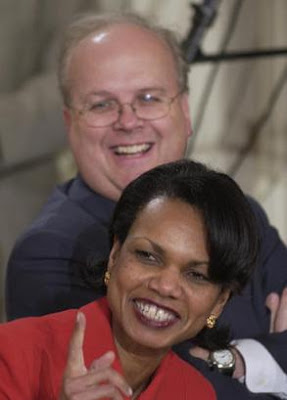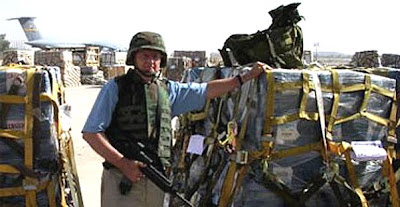Observations By Others
[Many people around the world collectively distrust and dislike Americans -- "Because Freedom", the usual reply of troglodyte animals like this knuckle-dragging liar -- but actually, they feel that way towards us because we are a loud, brash, childtime culture. With guns. And little compunction to have adult conversations about limiting their number, availability or use in our society.
[Freedom has nothing to do with it. We're a violent culture, subliminally and overtly. That's why other people in other places fear and distrust us -- because a large number of us are children, with guns.
[This reprint is from December, 2012, and June of 2014, and I am sick of reposting it.]
There are no real words for what happened in Connecticut, yesterday. There is plenty to say about how it happened.
I overheard someone at work (a classic gunnut owner who believes Negros
persons of color will overrun his part of the planet) observing that
"this [presumably, massacres committed by unstable individuals with
firearms] is the new normal".
On PBS' The News Hour, a professional psychologist asked to comment said (and I'm paraphrasing) that "It's important to say... this kind of tragedy doesn't happen every day... that schools really are safe places."
I reject the first comment. The second remark made me think: This fellow doesn't go to many Inner City schools, then -- massacres with 27 dead don't happen every day, that's true; but there are shooting incidents, and kids packing, and metal detectors, and education occurring against a solid backdrop of poverty and violence, every day.
The psychologist on News Hour was, I thought, trying to suggest themes parents might pass on to reassure their children (Don't worry, Timmy; It Can't Happen Here) -- that planes can crash, but the odds of going down in one, or having one crash on top of you, are hugely in your favor. And largely, that is true.
But planes do crash. Ships sink. Trains collide and buses plunge. Whenever that does happen, there are NTSB investigations, reconstructions and root-cause analyses. There are discussions with engineers and manufacturers about what to do to increase the chances such a tragedy doesn't happen again.
Only in cases like Sandy Hook does our national debate begin and end with, "Guns don't kill people; the people using them do". And that's it -- Pilot Error, essentially, is the public finding; and any other meme is just filler in the media. That, and people repeating, "It doesn't happen every day."
I'm sure that fact is a comfort to the extended families of twenty children, who died because they were shot with high-powered handguns. Twenty children.
I grew up around guns. I've owned firearms; at various times because I was required to carry them, but afterwards had no sane reason to keep them. I don't want them in my home.
We live in a world of high anxiety, and there are persons who want to exploit those feelings of danger, threat, and imminent disaster: Gun manufacturers, and their lobby, the NRA, are at the top of the list. Mike Huckabee and the rest of his fellow Xtian evangelical ilk; there are 2012 World-Enders, predicting massive earthquakes and crustal displacement and 'coastal events', and ultimately few survivors.
There are White Power fascists, and Survivalists, and the people who manufacture and sell them freeze-dried food and plans for bunkers to shield against the EMP bursts from North Korean-launched warheads, detonating high above the USA.
What happened in Sandy Hook yesterday has happened before -- in Columbine, in Denver; In Virginia; in a mall in Seattle last week; at a Dairy Queen in the Northwest. There may not be massacres, but annually there are many multiple-victim, firearm homicides in America.
And they will keep happening, until something changes about how firearm ownership and possession is discussed, and regulated, in this country.
The debate is not about Operator Error. It's not about something that happened "over there" in another city or state. It's about twenty dead children.
Along those lines are two, other very pertinent observations -- one, a part of the discussion at TPM Prime (Subscription Required):
[Many people around the world collectively distrust and dislike Americans -- "Because Freedom", the usual reply of troglodyte animals like this knuckle-dragging liar -- but actually, they feel that way towards us because we are a loud, brash, childtime culture. With guns. And little compunction to have adult conversations about limiting their number, availability or use in our society.
[Freedom has nothing to do with it. We're a violent culture, subliminally and overtly. That's why other people in other places fear and distrust us -- because a large number of us are children, with guns.
[This reprint is from December, 2012, and June of 2014, and I am sick of reposting it.]
(Photo: AP, via The New York Times)
There are no real words for what happened in Connecticut, yesterday. There is plenty to say about how it happened.
I overheard someone at work (a classic gun
On PBS' The News Hour, a professional psychologist asked to comment said (and I'm paraphrasing) that "It's important to say... this kind of tragedy doesn't happen every day... that schools really are safe places."
I reject the first comment. The second remark made me think: This fellow doesn't go to many Inner City schools, then -- massacres with 27 dead don't happen every day, that's true; but there are shooting incidents, and kids packing, and metal detectors, and education occurring against a solid backdrop of poverty and violence, every day.
The psychologist on News Hour was, I thought, trying to suggest themes parents might pass on to reassure their children (Don't worry, Timmy; It Can't Happen Here) -- that planes can crash, but the odds of going down in one, or having one crash on top of you, are hugely in your favor. And largely, that is true.
But planes do crash. Ships sink. Trains collide and buses plunge. Whenever that does happen, there are NTSB investigations, reconstructions and root-cause analyses. There are discussions with engineers and manufacturers about what to do to increase the chances such a tragedy doesn't happen again.
Only in cases like Sandy Hook does our national debate begin and end with, "Guns don't kill people; the people using them do". And that's it -- Pilot Error, essentially, is the public finding; and any other meme is just filler in the media. That, and people repeating, "It doesn't happen every day."
I'm sure that fact is a comfort to the extended families of twenty children, who died because they were shot with high-powered handguns. Twenty children.
I grew up around guns. I've owned firearms; at various times because I was required to carry them, but afterwards had no sane reason to keep them. I don't want them in my home.
We live in a world of high anxiety, and there are persons who want to exploit those feelings of danger, threat, and imminent disaster: Gun manufacturers, and their lobby, the NRA, are at the top of the list. Mike Huckabee and the rest of his fellow Xtian evangelical ilk; there are 2012 World-Enders, predicting massive earthquakes and crustal displacement and 'coastal events', and ultimately few survivors.
There are White Power fascists, and Survivalists, and the people who manufacture and sell them freeze-dried food and plans for bunkers to shield against the EMP bursts from North Korean-launched warheads, detonating high above the USA.
What happened in Sandy Hook yesterday has happened before -- in Columbine, in Denver; In Virginia; in a mall in Seattle last week; at a Dairy Queen in the Northwest. There may not be massacres, but annually there are many multiple-victim, firearm homicides in America.
And they will keep happening, until something changes about how firearm ownership and possession is discussed, and regulated, in this country.
The debate is not about Operator Error. It's not about something that happened "over there" in another city or state. It's about twenty dead children.
Along those lines are two, other very pertinent observations -- one, a part of the discussion at TPM Prime (Subscription Required):
Memekiller: ...for me, it's all about the NRA. I'm anti-NRA, not guns, and am offended by the strangle-hold they have over our politics. And I'm angry that Democrats have ceded the issue, only to have the NRA, if anything, put twice as much effort into unseating Democrats and Obama who, if anything, loosened rules on guns ...And the other, at The Great Curmudgeon :
... And the gun culture the NRA fosters... Would the prevalence of guns be as frightening without the culture of paranoia and conspiracies they perpetuate? It's not just about freedom to own a gun. The NRA culture is a cult of xenophobia and insanity. They don't seem to be aiming their message at responsible gun owners so much as the disgruntled and those prone to paranoia. They are less about developing an advocacy group than they are about assembling a well-armed militia of the mentally unstable.
BrokenOur discourse, that is. Fortunately, we have DDay trying to repair it.Just to pick at random, here are a couple headlines at the Hartford Courant site just from the past 24 hours: Woman Shot, Man Dead After Standoff In Rocky Hill. Armed Robbery At Hartford Bank, Two In Custody.It’s not that school shootings like this are abnormal. They are depressingly normal. The fact that there were no shootings in one day in New York City recently was seen as a major achievement, which shows you how desensitized we have become to gun violence as a normal occurrence of daily life.Just a reminder. The NRA is an industry lobby for the gun industry. The industry that makes consumer products largely designed to kill people. Not deer. Not rabbits.
People.



























